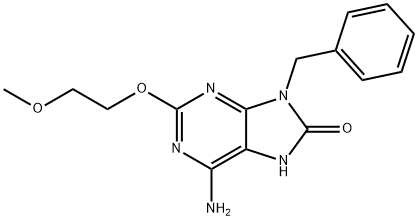A potential treatment for hepatitis C virus (HCV) is to induce immune cell-derived interferon (IFN) production using synthetic agonists of toll-like receptor 7 (TLR7). TLR7 ligand II is an orally bioavailable 8-hydroxyadenine analog that induces IFN production by binding to TLR7 on immune cells. It induces IFNα in human peripheral blood mononuclear cells with an EC50 value of 0.14 μM. At 10 μM, TLR7 ligand II was shown to reduce HCV levels by 60% in 24 hours in the human hepatocyte cell line Huh7, which carries a HCV replicon. It induces IFN in mice with a minimal effective dose of approximately 0.03 mg/kg, making it approximately 100-fold more potent than imiquimod .

